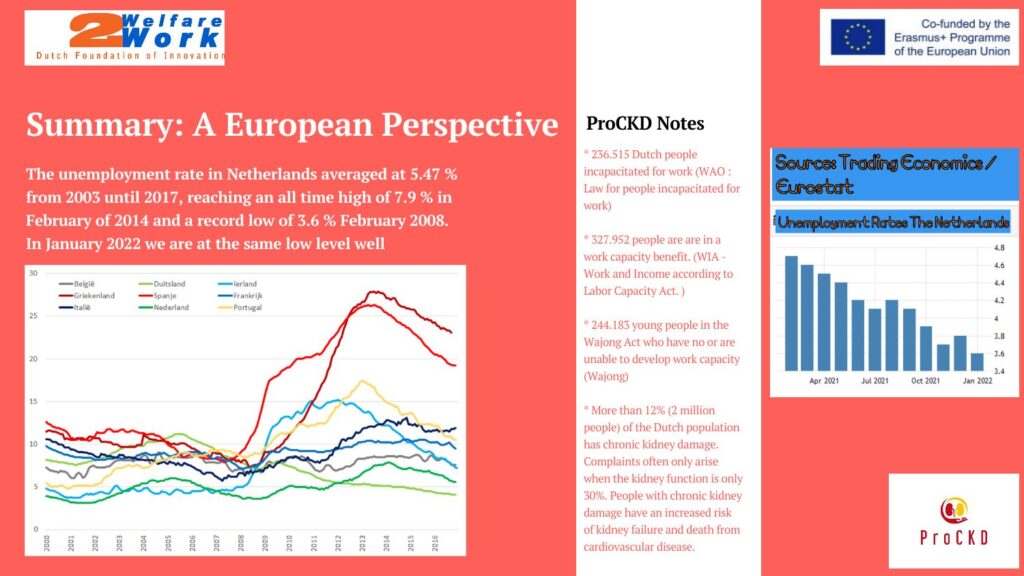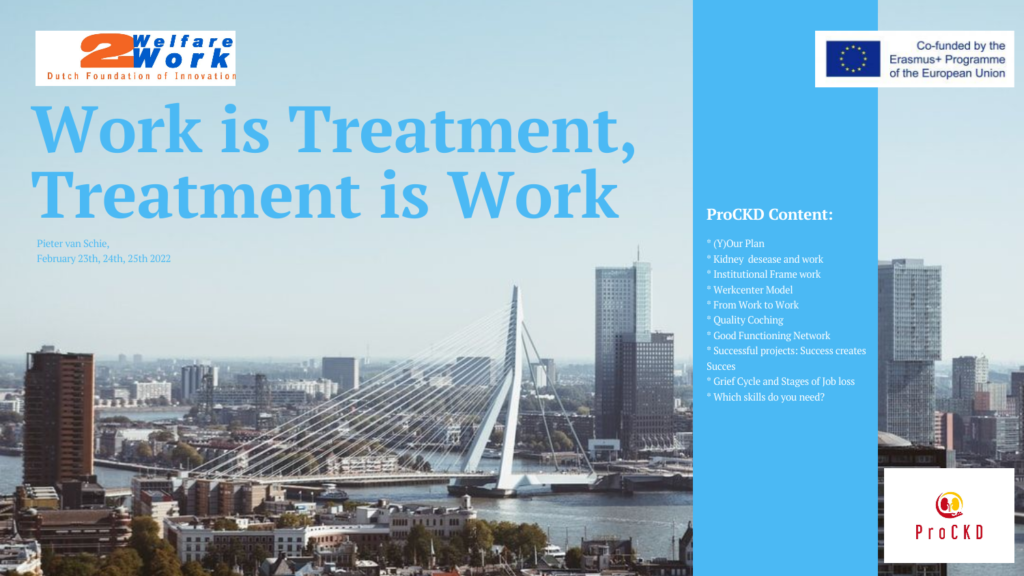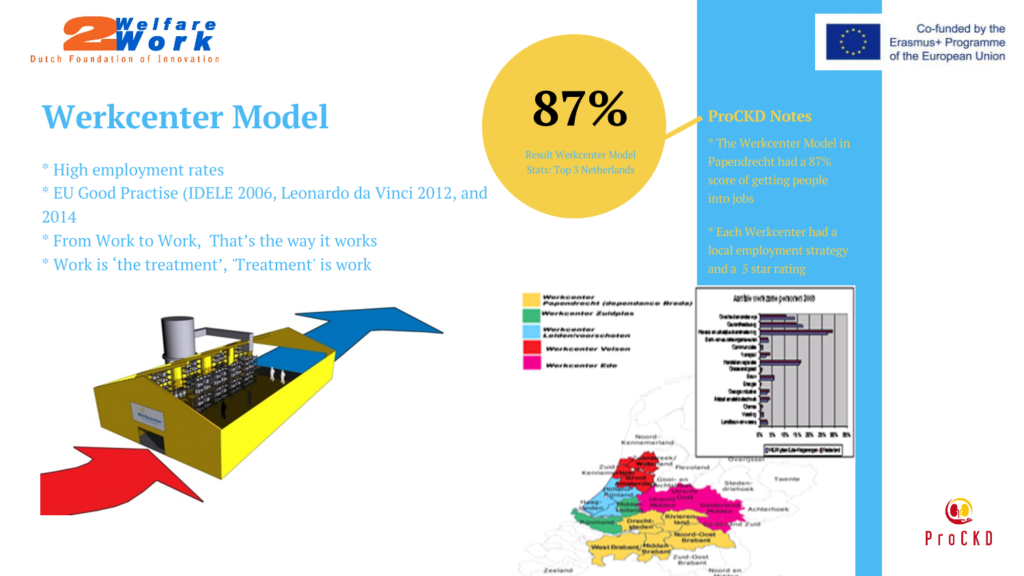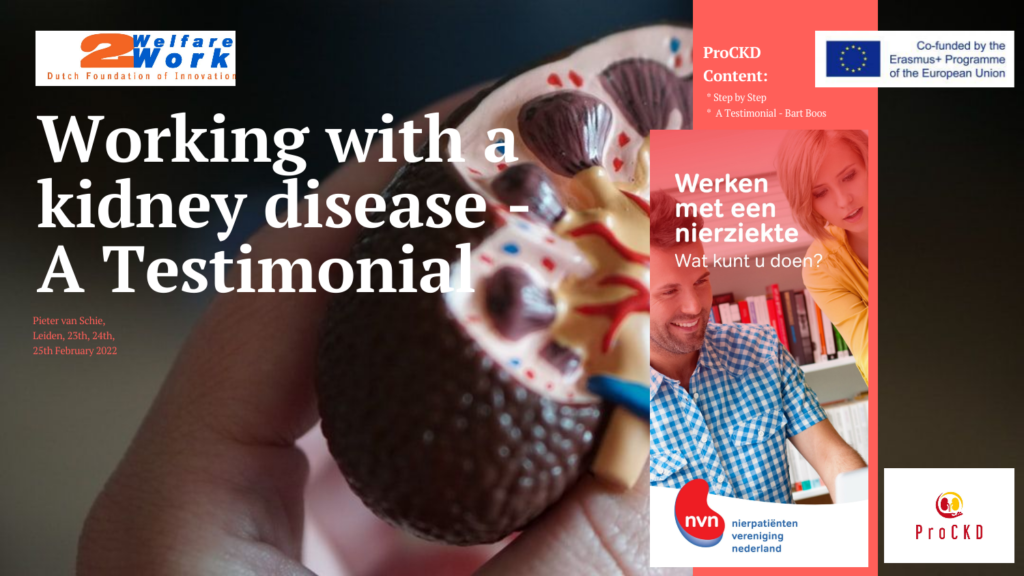Dutch ProCKD Snapshots

We have just finished the Dutch ProCKD training Days at Area071 in Leiderdorp, Zuid-Holland. The short-term joint staff training event was held in AREA071 an Employability and Entrepreneurial hub at the border of the city Leiden (The Netherlands) from February 23rd to the 25th 2022. The presentations and workshops supported the capacity building of the stakeholders and partners, thus helping the development of the necessary patient competences. The learning activities have been a good chance to show good practice in integrating patients with Chronic Kidney Disease as peer leaders in the world of work. The Dutch training days directly strengthened the competences of patients with Chronic Kidney Disease and their family to motivate them to engage in further professional development.
Dutch Employment, Employability and Entrepreneurship Study Days
The ProCKD Staff was trained during the Dutch training courses, that followed the principles of non-formal education through social entrepreneurship and employability, empowering them to become creators and promoters of their own brand. The emphasis during the ProCKD Training was on the dutch employabillity and entrepreneurship perspective. Some dutch Facts:

- The Dutch economy is booming, but the downside is that there is a major shortage of personnel. The Dutch economy is already bigger than before the corona crisis and this has impact in the labor market: there is a lot of demand for employees, so much that there are shortages.
- There are 126 vacancies for every 100 unemployed.
- In the Netherlands, 800,000 people are no longer able to do their work in whole or in part.
- 236.515 Dutch people incapacitated for work (WAO : Law for people incapacitated for work)
- 327.952 people are are in a work capacity benefit. (WIA -Work and Income according to Labor Capacity Act. )
- 244.183 young people in the Wajong Act who have no or are unable to develop work capacity (Wajong)
- More than 12% (2 million people) of the Dutch population has chronic kidney damage. Complaints often only arise when the kidney function is only 30%. People with chronic kidney damage have an increased risk of kidney failure and death from cardiovascular disease.
The unemployment rate in Netherlands averaged at 5.47 % from 2003 until 2017, reaching an all time high of 7.9 % in February of 2014 and a record low of 3.6 % February 2008. In January 2022 we are at the same low level.
Work is Treatment

Many people who start dialysis or have a transplant want to go back to work. Some people feel it helps them get their lives get back to normal. Some people continue to work full time as they begin treatment. Others switch to a part-time or flexible schedule. Some people ask for jobs that are less physically demanding. The topics kidney patients want to discuss with their employer are:
- Changing your work schedule to allow for dialysis and healthcare visits
- Making up time taken off for medicalreasons
- Physical limitations, if any
- What to do in case of an emergency
- Activity Models for All
A very good example of an activity model is the Werkcenter Model. This model consists the following principles:
- One Size fits all
- Sanction
- Participation
- Everybody can do something
- Work First / Work as a treatment: Real Work
- Reward – If you work you should get paid
- From Work to Work
- Own Responsibility
- Local and regional Entrepreneurial strategy of the municipalities / councils: National government forced them to act as a enterprise

ProCKD Study Visit Area071
The local context was that of Leiden/Leiderdorp, the so-called Areao071, whereas the Dutch Foundation of Innovation Welfare 2 Work runs hosts many projects and training days. The ProCKD participants were able to experience:
* various Dutch ideas and concepts around employment, employability, and entrepreneurship;
* new development lines of reflection and actions for improving support packages for employment and entrepreneurship for kidney patients
* the outline of the successful Dutch Labour Market Strategies and Entrepreneurship Culture
* the basis for building a webinar and knowledge building around the concept ‘Work is treatment and Treatment is Work’;
* discuss new pathways and strategies of Work, Entrepreneurship, Health, and Quality of Life (and Happiness)
* feedback and tell about their own experiences and good practices
ProCKD II
On Friday February 25th the purpose of the Dutch ProCKD learning activities was also to give feedback (and to assess) the good practices to certain project ideas, like ProCKD II. Especially by checking if proposed tools and approaches, used in the Netherlands to the realities of staff from all the involved countries and different working contexts could be suitable to implement in a follow up EU-project.

In addition, the participants gave input and feedback on the overall training and study visits, its content, and the ability to understand and apply the content in different realities. The learning activities were also a space to provide peer support which is crucial in this kind of internal development process and to provide guidance for each other. The training course offered the participants a unique space to become the multipliers of the project in their field of work.
The training directly strengthened the competencies of staff to be able to counsel and mentor other staff and kidney patients for employability and entrepreneurship opportunities, and to motivate them to engage in further professional development.
